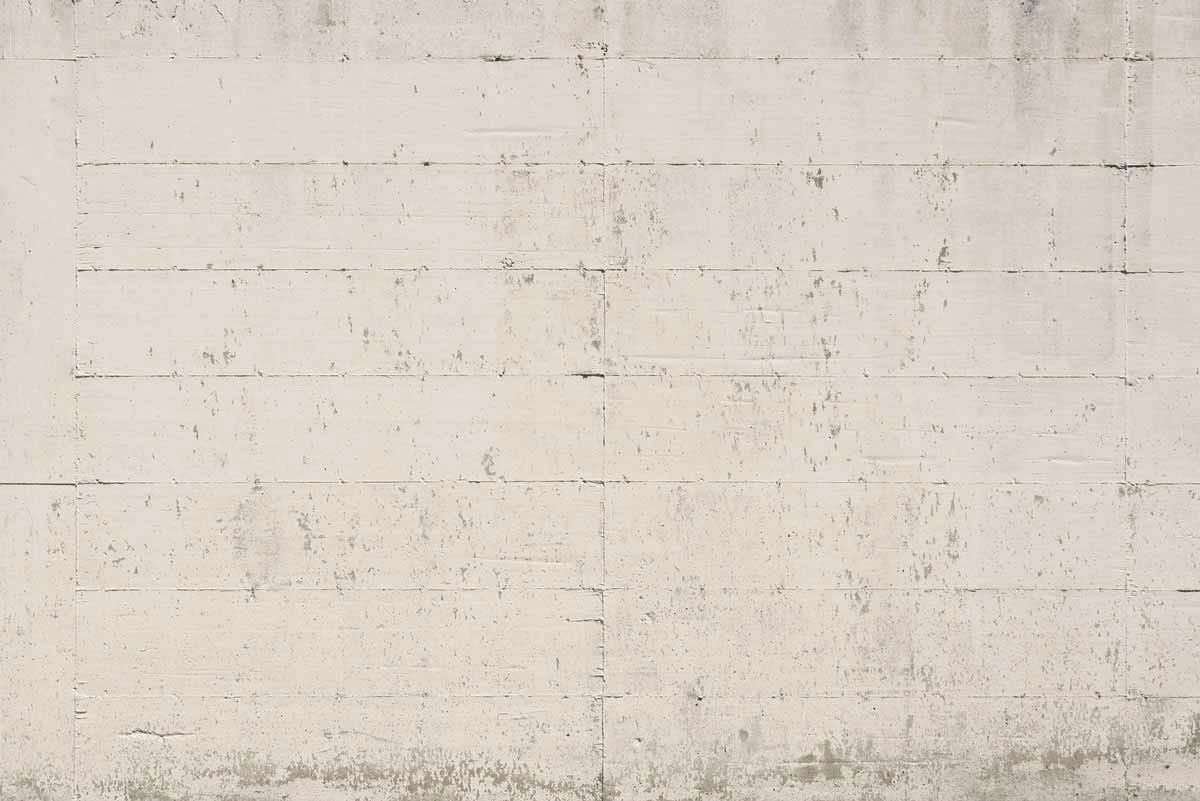DISPONIBILE IN CD
QUALITA' MADE IN ITALY
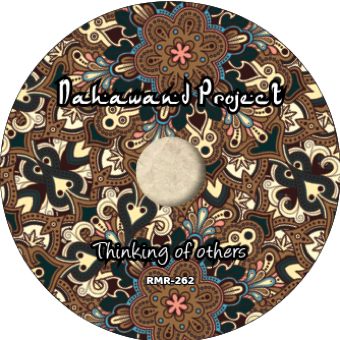
Digipack 3 ante, carta artistica speciale
Libretto 13,5x12 20 pagine
Musica Araba / Siria
TRACKLIST
1. Pensa Agli Altri 1:18
2. Mawwal 2:58
3. Samai Nahawa nd di Mu nir Bashir 4:49
4. Fogh el nakhl 3:39
5. Lettera di u na madre araba al figlio 3:24
6. Lamma Bada 4:44
7. Longa Riad sumbati 6:00
8. Una lezione di Kamasutra (Aspettala) 3:33
9. Bint al shala byia 7:10
10. Ta qsim oud (improvvisazione strumentale) 3:15
11. Nel palazzo dove vivevo da bambina 3:09
12. Nami Nami 3:04
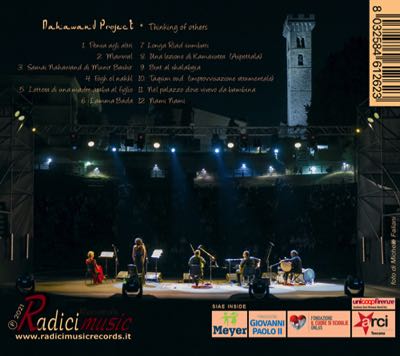
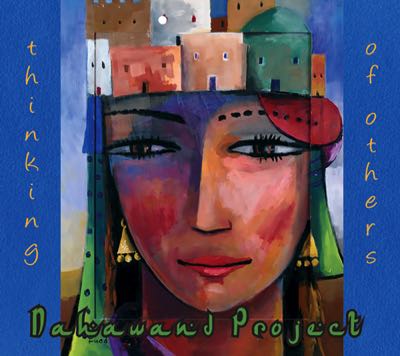
NAHAWAND PROJECT, NahawandProject, dal 2016 ricerca un dialogo tra musica e cultura araba e mondo occidentale. Brani di tradizione araba, strumentali e vocali, insieme alla parola poetica, attraversano la bellezza struggente dell’amore e la spietata ferita che ogni guerra lascia nelle vite di uomini, donne e bambini. Dopo vari concerti in Toscana per Aleppo, e la serata del 31 luglio 2021 al Teatro Romano di Fiesole –organizzati da UniCoop Firenze - nasce questo cd. Dedicato ad Aleppo e a tutti i bambini che sono nati e cresciuti in guerra: inno alla libertà e alla speranza.
MUSICISTI:
VALENTINA F. BARLACCHI: voce
EMANUELE LE PERA: tamburi a cornice, darabouka, riq, tabla egiziana, cavigliere, sonagli
GHAZI MAKHOUL: oud , voce
SAVINO PANTONE: violino, viola
CECILIA GALLIA: voce recitante
I siriani hanno bisogno di noi
«Grazie per essere arrivati ad Aleppo», ci disse abuna Firas Lutfi, francescano, siriano, che ha vissuto ad Aleppo durante gli anni della guerra. Eravamo partiti dalla Toscana, grazie all’impegno delle Fondazioni Giovanni Paolo II, Il Cuore si scioglie, dell’ospedale e della Fondazione Meyer e dell’ARCI per fare progetti per i bambini e le bambine di Aleppo.
Antonio, Benedetto, Carla, Gianluca, Rita, Lucia, Valentina, Matteo, Silvia, Renato, Claudio, Barbara ed Elisabetta hanno iniziato, dal 2017, ad aiutare chi durante la guerra ha patito più di tutti: i bambini. Questo CD è dedicato a loro.
Aleppo, prima della guerra, era una città turistica, con il suo aeroporto internazionale; con monumenti e il suk più bello e lungo di tutto il mondo; aveva moschee e chiese antichissime, musei e una vivace attività culturale con poeti, cineasti, artisti, teatri. Tutto è andato distrutto, tranne la «cittadella fortificata», segno della rinascita della città e dei suoi abitanti.å
Dalla Toscana sono partiti, nel 2017, due progetti di aiuto concreto per i bambini: il primo con una associazione aleppina «Mano nella mano», in arabo Yadan bi yad, diretta da una donna, Zeinab Kaaula, per aiutare i bambini che hanno subito traumi fisici; il secondo con i francescani della Custodia di Terra santa, guidato da abuna Firas Lutfi, per aiutare chi ha avuto traumi psicologici. Tutti e due i progetti resi possibili grazie al sostegno della Fondazione Meyer e al personale dell’ospedale pediatrico Meyer, una eccellenza nella cura dei più piccoli.
In questi anni, accanto ai viaggi ad Aleppo per curare i bambini, abbiamo realizzato in Toscana alcuni concerti nei circoli ARCI e nelle Case del Popolo, grazie all’impegno del gruppo dei «Nahawand Project», formato da Emanuele Le Pera, Ghazi Makhoul, Savino Pantone, Valentina Barlacchi, con la partecipazione di Cecilia Gallia, voce recitante. Sabato 31 luglio 2021, il gruppo si è esibito a Fiesole, nel Teatro romano, grazie all’aiuto di tanti amici, fra i quali Massimo Gramigni e Stefano Bertini; alla presenza del vescovo di Fiesole, mons. Mario Meini, e del sindaco di Fiesole, Anna Ravoni.
Da quella serata e dall’esperienza di questi anni, nasce questo CD.
Le foto che lo arricchiscono sono di Michele Faliani e di Antonio Chiavacci. Se qualcuno, dopo averlo ascoltato, vuole avere maggiori informazioni sulle realtà che hanno contribuito a questi progetti per il sogno dei bambini e delle bambine di Aleppo può farlo visitando i siti web:
www.ilcuoresiscioglie.it www.fondazionemeyer.it www.arcitoscana.it www.fondazionegiovannipaolo.org
L’ultimo grazie va ai quattro presidenti che hanno permesso tutto questo: Daniela Mori, Gianpaolo Donzelli, Gianluca Mengozzi, Andrea Bottinelli e al vescovo Luciano Giovannetti.
Renato Burigana
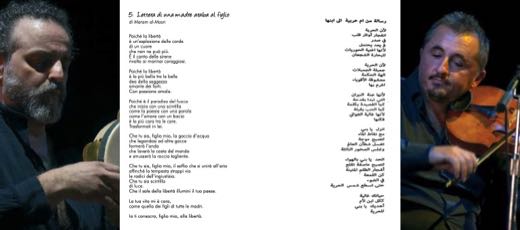
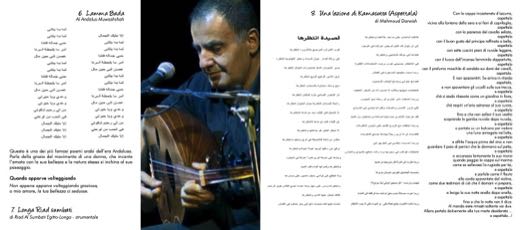
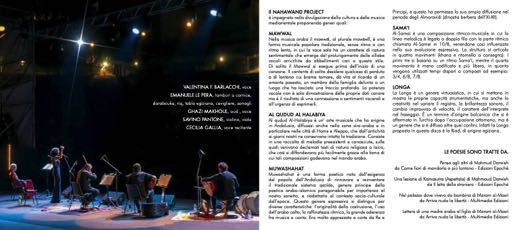
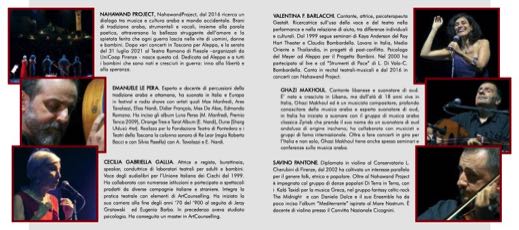
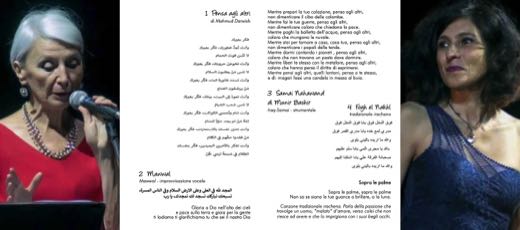
THE SYRIANS NEED US
“Thank you for having come to Aleppo” is what Abuna Firas Luftì, Franciscan and Syrian, who lived in Aleppo during the war years, said to us. We left Tuscany - thanks to the commitment of the John Paul II Foundations, the ‘il Cuore si Scioglie’ Foundation, the Meyer hospital and the Meyer Foundation and the ARCI - to do projects for the boys and girls of Aleppo. Since 2017, Antonio, Benedetto, Carla, Gianluca, Rita, Lucia, Valentina, Matteo, Silvia, Renato, Claudio, Barbara and Elisabetta started helping those who suffered the most during the war: the children. This CD is dedicated to them.
Before the war, Aleppo was a tourist city, with its own international airport, with monuments and the longest and most beautiful souk in the world. It had ancient mosques and churches, museums and lively cultural activity with poets, filmmakers, artists and theaters. Everything was destroyed, except for the “fortified citadel”, a sign of the rebirth of the city and its inhabitants.
In addition to trips to Aleppo, in recent years we held some concerts in Tuscany, thanks to the commitment of the Nahawand Project group formed by Emanuele Le Pera, Ghazi Mokhoul, Savino Pantone, Valentina Barlacchi and Cecilia Gallia. On July 31, 2021, the group performed in the Roman Theatre in Fiesole.
To know more about the realities that contributed to these projects for the children of Aleppo, you can visit the following web sites: www.ilcuoresiscioglie.it - www.fondazionemeyer.it
www.arcitoscana.it - www.fondazionegiovannipaolo.org
Renato Burigana
POETS
MAHMOUD DARWISH, (March 13, 1942, Al-Birwa, Palestine - August 9, 2008, Houston, Texas, U.S.), Palestinian poet who gave voice to the struggles of the Palestinian people. After the establishment of the State of Israel in 1948, Darwish witnessed massacres that forced his family to escape to Lebanon. A year later their clandestine return to their homeland put them in limbo, as they were declared “present-absent aliens.” Darwish left El-Birwa a second time in 1970 and traveled to the Soviet Union to complete his education in Moscow. He lived in Cairo, Beirut, London, Paris and Tunis, before returning in 1996 to live in Palestine, a Ramallah. He was a member of the executive committee of the Palestine Liberation Organization (PLO).
Darwish authored several books of prose and more than 20 collections of poetry. From 1981 he also served as editor of the
literary journal Al-Karmel. The power of his poetry could be explained by the sincerity of his emotions and the originality of his poetic images. He borrowed from the Old and New Testaments, classical Arabic literature, Arab Islamic history, and Greek and Roman mythology to construct his metaphors. It was Darwish’s conviction that his life in exile inspired his creative work. He often personified Palestine itself as a mother or a cruel beloved. Darwish’s work was translated into some two dozen languages.
MARAM AL-MASRI is from Lattakia in Syria, now settled in Paris. She studied English Literature at Damascus University before starting publishing her poetry in Arab magazines in the 1970s. Today she is considered one of the most renowned and captivating feminine voices of her generation. She writes in both Arabic and French. She writes with a clarity and directness that pierces to the heart of things, most especially in poems that remorselessly trace the destruction of her homeland, that inquire with a cool intelligence into the condition of women in our time. She has achieved a great success in Europe with her poem A red cherry on a white-tiled floor.
COVER
FUAD AZIZ was born in 1951 in Arbil, Iraqi Kurdistan. He graduated
from the Baghdad Academy of Fine Arts in 1974, and later from the Florence Academy of Fine Arts.
Fuad wrote and illustrated several children’s books, and created sculptures that were presented in numerous solo and group exhibitions in Italy and abroad. He trains teachers and cultural operators in image education and the creation of illustrated stories.
MUSICIANS
NAHAWAND PROJECT, Since 2016, the Nahawand Project, has been searching for a dialogue between the Arab culture and music and that of the Western world. Songs of Arabic tradition, instrumental and vocal, together with poetry, traverse the poignant beauty of love and the merciless wounds that every war leaves in the lives of men, women and children. After various concerts for Aleppo in Tuscany, and the evening of July, 31st 2021 at the Roman Theatre in Fiesole - organized by UniCoop Firenze - this CD was born. It is dedicated to Aleppo and to all children who were born and raised in the war: It is a hymn to freedom and hope.
NAHAWAND PROJECT
VALENTINA F. BARLACCHI, voice
EMANUELE LE PERA, frame drums, darabouka, riq, egyptian tabla, anklets, rattles
GHAZI MAKHOUL, oud , voice
SAVINO PANTONE, violin, alto
CECILIA GALLIA, dramatic reading
EMANUELE LE PERA. Expert and teacher of traditional Arab and Ottoman percussions, Emanuele Le Pera has played in festivals and radio shows in Italy and Europe with Max Manfredi, Ares Tavolazzi, Elias Nardi, Didier François, Max De Aloe, Edmondo Romano. He recorded the albums Luna Persa (M. Manfredi, Premio Tenco 2009), Orange Tree and Tarot Album (E. Nardi), Dune (Sharg Uldusù 4tet) and authored the soundtrack Re Lear for the Fondazione Teatro di Pontedera and the Teatri della Toscana (directed by Roberto Bacci and Silvia Pasello) with A. Tavolazzi and E. Nardi.
CECILIA GABRIELLA GALLIA is an actress and a theatre director, a puppeteer, a theatre workshops instructor for children and adults. A speaker recording audiobooks for UIC (Italian Association for Visually Impaired People) since 1999. She has been working for different institutions and participating in performances produced by Italian and foreign theatre companies. She incorporates her theatre practice with ArtCounselling skills. She began her theatre carrier in the late seventies following Jerzy Grotowski’s and Eugenio Barba’s theatre. Previously she studied Psychology and got an ArtCounselling degree.
VALENTINA F. BARLACCHI. Singer, actress and Gestalt psycotherapist. Researcher on the use of voice in performance and theatre, and of the helping relationship in individual and cultural differences. Since 1999, she follows the seminars of Claudia Bombardella, and Kaya Anderson of Roy Hart Theater. Valentina works in Italy, the Middle East and Thailand on post-conflict projects, and is also a psychologist for Meyer in Aleppo for the Children’s Project. In 2000, she participated in the live performance and CD recording of ‘Instruments of Peace’ by L. Di Volo-C. Bombardella. She sings in theatrical-musical recitals, and since 2016 also in concerts with the Nahawand Project.
GHAZI MAKHOUL is a Lebanese music composer, profound connoisseur of the Arabic music and expert of the oud. He was born and raised in Lebanon, but he moved to Italy at the age of 18 years old. His career in Italy kicked off in the 80s, when he joined “Zyriab”, the well known Arabic classical music group. Ghazi Makhoul, alongside collaborating with artists of international fame, also plays in venues all around Italy and the world and hosts conferences on Arabic music.
SAVINO PANTONE graduated in violin at the L. Cherubini Conservatory in Florence; from 2002 he cultivated a parallel interest in the folk, ethnic and popular genre. Other than the Nahawand Project, he is involved in the popular dance group Di Terra in Terra, the Kaló Taxidi for Greek music, in the celtic-rock fantasy group The Midnight, and has recently recorded the album “Mediterrante” inspired by the Mare Nostrum with Daniela Dolce and her Ensemble. He is a violin teacher at the Cicognini National Boarding School.
Bluestown Music
L'album "Thinking Of Others" dei Nahawand Project ci porta in una direzione musicale completamente diversa da quella a cui siamo abituati. L'album di questa formazione italiana è pieno di suoni arabi di natura molto malinconica e malinconica. Le sonorità arabe non sono del tutto sconosciute al mondo del rock. Prendiamo ad esempio "Kashmir" dei Led Zeppelin....
Il Nahawand Project è composto da Valentina F. Barlacchi (voce), Emanuele Le Pera (tamburi a cornice, darabouka, riq, tabla egiziana, cavigliere, sonagli), Ghazi Makhoul (voce, oud), Avino Pantone (violino, viola) e Cecilia Gallia (voce narrante).
Il loro nuovo album è un omaggio alla città siriana di Aleppo, una città nel nord-ovest della Siria che è stata quasi completamente distrutta durante la guerra civile, compreso il centro storico medievale.
L'album inizia con Cecilia Gallia che racconta Pensa Agli Altri. Poiché non parlo italiano, non conosco il contenuto di questa storia. Segue il dolente Mawwal, cantato in modo penetrante da Ghazi Makhoul, accompagnato da cupi suoni di violino.
Segue Samai Nahawa Nd Di Mu Nir Bashir, uno strumentale iracheno. Fragile oscillazione con parti principali per il violino, l'oud e le tabla egiziane. Nel tradizionale iracheno Fogh El Nakhl, la voce limpida di Valentina F. Barlacchi duetta con quella tormentata di Ghazi Makhoul. Si possono ascoltare anche nella versione musicale della poesia Lamma Bada. Una fragile canzone ondeggiante con un doloroso violino graffiante.
Longa Riad Sumbati sembra molto più leggero. Uno strumentale dal suono frizzante e dalle percussioni spumeggianti. Il violino rovente di Avino Pantone è protagonista del tradizionale arabo Bint Al Shala Byia. L'oscura Nami Nami chiude l'album.
Un album impressionante pieno di penetrante musica araba. Posso consigliare ai fan dei Led Zeppelin di dare un ascolto a questo album!
28/5/22 - Nahawand Project è nella playlist della trasmissione MONDOPHON su Radio ARA con Willi Klopottek in Lussemburgo
16/4/22 - LINEATRAD recensione di Loris Böhm
Per la magistrale grafica della confezione, per le foto, la traduzione in tre lingue, per la qualità e la bellezza dei brani proposti, di tradizione siriana, arabo-andalusa, irachena, possiamo considerare questo album del Na- hawand Project come uno dei più rappresen- tativi dell'intero catalogo Radicimusic. Difficile non rimanere estasiati dai magici quasi soprannaturali suoni del gruppo che si esibisce per aiutare la popolazione di Aleppo. I poeti menzionati sono Mahmoud Darwish e Maram Al Masri, i generi tradizionali pro- posti sono Mawwal, Al qudud al halabiya, Muwashahat, Sama'i, Longa, i musicisti sono: Emanuele Le Pera (drums, darabouka, riq, tabla egiziano, anklets e rattles), Ceci- lia Gabriella Gallia (recitazione drammatica), Valentina F: Barlacchi (voce), Ghazi Makhoul (oud, voce), Savino Pantone (vio- lino, alto). Il progetto va sostenuto acqui- stando il disco, che contiene dodici tracce di grande intensità narrativa e musicale.
1) Pensa Agli Altri, 2) Mawwal, 3) Samai Bashir, 4) Fogh Nakhl, 5) Lettera Di Una Madre Araba Al Figlio, 6) Lamma Bada, 7) Longa Riad Sumbati, 8) Una Lezione Di Ka-masutra (Aspettala), 9) Bint Al Shalabuyia, 10) Taqsim Oud, 11) Nel Palazzo Dove Vi- vevo Da Bambina, 12) Nami Nami.
Digipack a tre ante, la confezione di questo CD è realizzata con carta
artistica di cartiere italiane, assemblata a mano da artigiani locali
i
